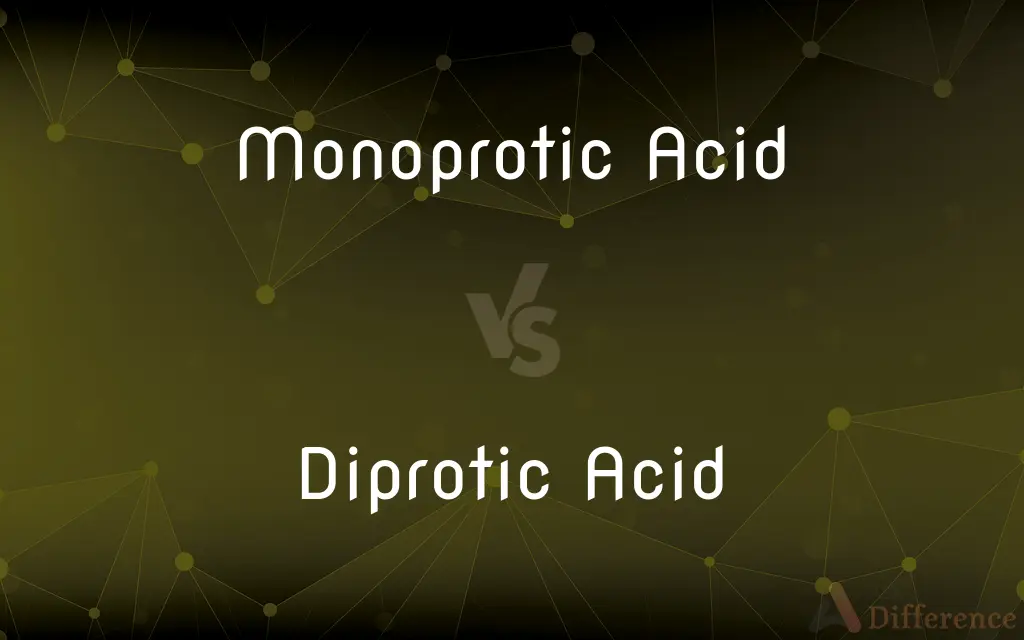Monoprotic Acid vs. Diprotic Acid — What's the Difference?
Edited by Tayyaba Rehman — By Fiza Rafique — Published on December 4, 2023
Monoprotic Acid can donate one proton (H⁺) per molecule, while Diprotic Acid can donate two protons (H⁺) per molecule.

Difference Between Monoprotic Acid and Diprotic Acid
Table of Contents
ADVERTISEMENT
Key Differences
Monoprotic Acid is an acid that releases only one proton (H⁺) when it dissociates in a solution. On the other hand, Diprotic Acid can release two protons (H⁺) sequentially during its dissociation.
While Monoprotic Acid examples include hydrochloric acid (HCl), where one molecule gives one proton, Diprotic Acid examples like sulfuric acid (H₂SO₄) can provide two protons.
Both Monoprotic Acid and Diprotic Acid can impact the pH of a solution, but the extent and rate of pH change might differ due to the number of protons donated.
Titration studies with Monoprotic Acid show one equivalence point, representing the moment when all of its protons have been neutralized. In contrast, a Diprotic Acid exhibits two equivalence points, corresponding to the neutralization of its two protons.
In terms of acid strength, a Monoprotic Acid's strength is gauged by its dissociation constant, whereas a Diprotic Acid can have two dissociation constants – one for each proton.
ADVERTISEMENT
Comparison Chart
Number of Protons Donated
One proton (H⁺) per molecule
Two protons (H⁺) per molecule
Example
Hydrochloric acid (HCl)
Sulfuric acid (H₂SO₄)
Equivalence Points
One
Two
Dissociation Constants
One dissociation constant
Two dissociation constants
Typical pH Effect
Changes pH based on one H⁺
Changes pH based on two H⁺s
Compare with Definitions
Monoprotic Acid
Contains one dissociation constant.
The Monoprotic Acid, HNO₃, has a single Ka value.
Diprotic Acid
Characterized by two dissociation constants.
The Diprotic Acid, H₂SO₄, has two Ka values corresponding to its two protons.
Monoprotic Acid
Acid that donates one proton.
Hydrochloric acid (HCl) is a common Monoprotic Acid.
Diprotic Acid
Acid that donates two protons.
Sulfuric acid (H₂SO₄) is a well-known Diprotic Acid.
Monoprotic Acid
Reacts to neutralize one base molecule.
One molecule of a Monoprotic Acid will neutralize one molecule of a base.
Diprotic Acid
Has two acidic hydrogens.
The Diprotic Acid, H₂CO₃, can release two H⁺ ions in a solution.
Monoprotic Acid
Has one acidic hydrogen.
In a solution, the Monoprotic Acid, HF, releases one H⁺.
Diprotic Acid
Shows two equivalence points.
During a titration, a Diprotic Acid will exhibit two pH jumps.
Monoprotic Acid
Exhibits one equivalence point.
During titration, a Monoprotic Acid will have a single pH jump.
Diprotic Acid
Neutralizes two base molecules.
A molecule of a Diprotic Acid will neutralize two molecules of a base.
Common Curiosities
How many equivalence points does a Diprotic Acid have in a titration?
A Diprotic Acid has two equivalence points.
Can a Diprotic Acid release both protons at once?
Typically, a Diprotic Acid releases its protons sequentially, not simultaneously.
Can a Monoprotic Acid have two dissociation constants?
No, a Monoprotic Acid has only one dissociation constant.
Are Monoprotic Acids generally weaker than Diprotic Acids?
Not necessarily; acid strength depends on factors beyond just proton count.
Are all acids either Monoprotic or Diprotic?
No, acids can be monoprotic, diprotic, or even triprotic (donating three protons).
How does pH change differ between a Monoprotic Acid and a Diprotic Acid?
A Diprotic Acid can cause two pH shifts due to its two protons, whereas a Monoprotic Acid causes one shift.
What is the main difference between a Monoprotic Acid and a Diprotic Acid?
A Monoprotic Acid donates one proton, while a Diprotic Acid donates two.
Give an example of a Monoprotic Acid.
Hydrochloric acid (HCl) is an example of a Monoprotic Acid.
Does a Diprotic Acid have one or two dissociation constants?
A Diprotic Acid has two dissociation constants.
Do both Monoprotic Acid and Diprotic Acid change the pH of solutions?
Yes, both affect pH, but the rate and extent can differ.
Is sulfuric acid a Diprotic Acid?
Yes, sulfuric acid (H₂SO₄) is a Diprotic Acid.
How does a Monoprotic Acid react with bases?
A Monoprotic Acid will neutralize one molecule of a base.
Can a Diprotic Acid ever behave like a Monoprotic Acid?
Under certain conditions, a Diprotic Acid might release only one proton, acting like a Monoprotic Acid.
Which acid type, Monoprotic or Diprotic, is more common?
Both types are common, but the context determines their prevalence.
Can the second proton of a Diprotic Acid be harder to release than the first?
Yes, often the second proton of a Diprotic Acid is less acidic and harder to release.
Share Your Discovery

Previous Comparison
Greece vs. Rome
Next Comparison
Electron Gain Enthalpy vs. ElectronegativityAuthor Spotlight
Written by
Fiza RafiqueFiza Rafique is a skilled content writer at AskDifference.com, where she meticulously refines and enhances written pieces. Drawing from her vast editorial expertise, Fiza ensures clarity, accuracy, and precision in every article. Passionate about language, she continually seeks to elevate the quality of content for readers worldwide.
Edited by
Tayyaba RehmanTayyaba Rehman is a distinguished writer, currently serving as a primary contributor to askdifference.com. As a researcher in semantics and etymology, Tayyaba's passion for the complexity of languages and their distinctions has found a perfect home on the platform. Tayyaba delves into the intricacies of language, distinguishing between commonly confused words and phrases, thereby providing clarity for readers worldwide.













































